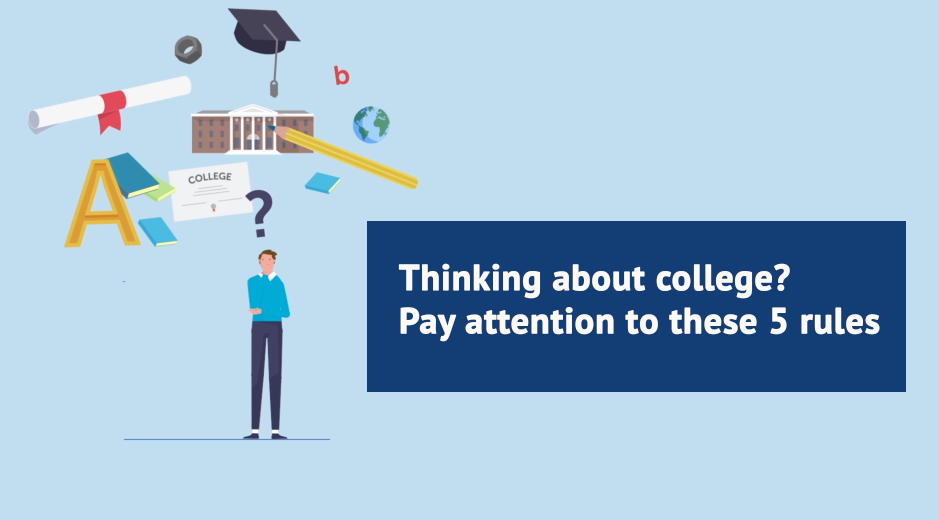
Thinking about college? Pay attention to these 5 rules
Now more than ever, postsecondary education is a key pathway to economic independence. Before the 1980s, two-thirds of jobs required a high school education or less. Now, the same share of jobs requires at least some college.
But just as postsecondary education has become more valuable, it has also become more expensive. At four-year public colleges and universities, tuition and fees have risen 19 times faster than average family incomes since 1980. Many people can’t afford to repay their student loans, resulting in a default rate of 11.5 percent—a burden on taxpayers.
With these outcomes, it’s little wonder that a significant number of college-educated learners experience some kind of buyer’s remorse. A 2017 Gallup Poll found that given the chance, more than half of Americans would change their degree type, institution, or major.
So how can students avoid this regret? One strategy is to carefully explore the probable financial outcomes of their educational choices. Recently, we examined the data and developed five guidelines for making informed decisions:
- Generally, more education is better. Workers with BAs have median earnings of $62,000, compared to $47,000 for those with associate’s degrees, and $36,000 for those with high school diplomas. Graduate degree holders fare even better than those with BAs, with median earnings of $80,000.
- Field of study can be more important than education level. Graduates with BAs in architecture and engineering have median earnings of $85,000, compared to $46,000 for those with BAs in education.
- While major matters, discipline is not destiny. The top 25 percent of workers with BAs in the arts and humanities earn more than the bottom 25 percent with BAs in architecture and engineering.
- Less education can be worth more. The median earnings of workers with associate’s degrees in science, technology, engineering, and mathematics (STEM) are higher ($60,000) than the median earnings of those with BAs in education ($46,000).
- Earnings gaps persist across career paths. Workers with BAs in the humanities and liberal arts have peak median earnings of $66,000, compared to the $103,000 at peak earning years for those with BAs in architecture and engineering. An earnings gap persists from the beginning to the end of their careers.
To further guide students and their families, we created an interactive College Major Earnings Tool that allows users to examine earnings by major at the state and national level.
While no student should choose a major based purely on earning potential, all students should know what the payoff is likely to be before making the first major investment in their journey from youth dependency to adult independence.
Watch our video and visit our website to learn more about Five Rules of the College and Career Game.

Dean of Liberal Arts 1994-2015; Adjunct Professor, Waterford Institute of Technology
5yThe most important point here is that discipline isn’t destiny. But more than this a liberal arts lays the foundation for success as a specialised professional. During a discussion of why Mark Zuckerberg just was clueless about the socio-political consequences of Facebook, Kara Swisher the NYTimes Tech Editor’s answer was simple and direct: “Because” she said, he never took Humanities courses.”
#Provost focused on #StudentEngagement, #TransformativeLearning, #FacultyMentoring, #CommunityEngagement, #Compassion, #GlobalPerspective
5yThe problem with this analysis is its focus on income as the only metric for satisfaction with a college education. Many individuals who choose to major in the arts or humanities do so knowing full well higher wages are available to those majoring in finance. They make their choice anyway - expecting a fulfilling job as an employee at a museum or non profit agency or teacher. And we need people in all those jobs.
Visionary leader, commended for empowering highly effective teams and transforming schools’ ethos into inclusive, values-driven communities.
5yGreat article for our trending school-leavers and upcoming entrepreneurs, but doesn’t do much to assist the comparatively lagging education sector and the diminishing number of teachers globally. Perhaps another opportunity for soapbox politicians. The debate will go on ...